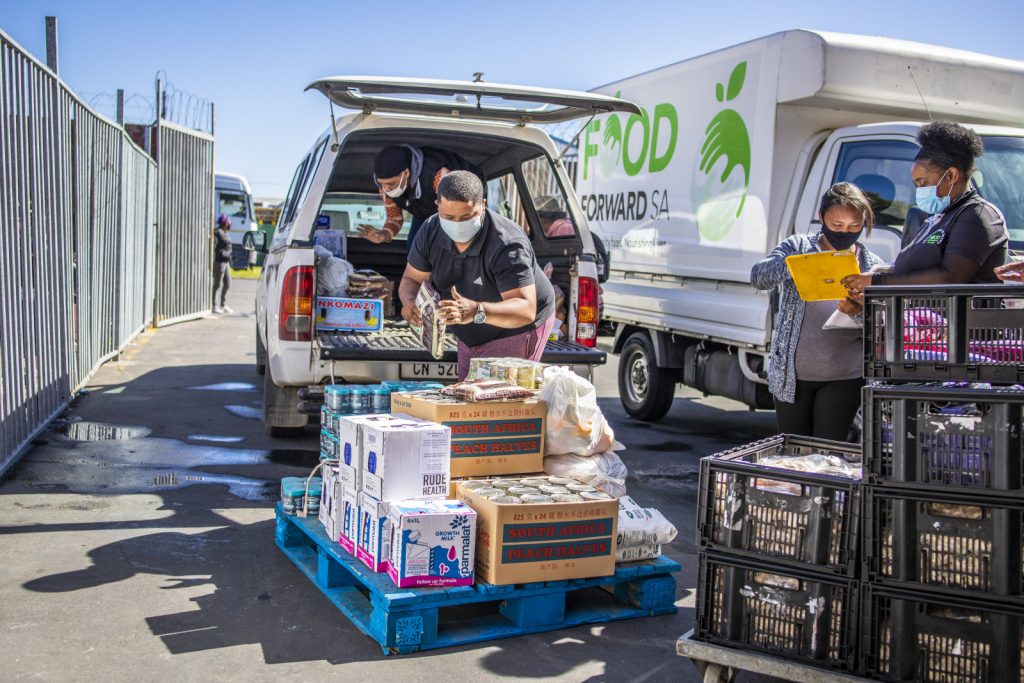Beneficiary organisations collect a monthly supply of fresh produce and non-perishable food from a FoodForward SA Northern Cape warehouse. Photo: FFSA
South Africa’s largest food redistribution nonprofit believes it can solve food insecurity through its foodbanking model, but says the government must put in place a food donations policy to do so.
“We have requested this for years but nothing has been done,” said Andy du Plessis, the managing director of FoodForward SA (FFSA), which was established in 2009.
The nonprofit recovers edible surplus food from farmers, manufacturers and retailers, and distributes it through 2 750 registered nonprofit and beneficiary organisations to 950 000 vulnerable people daily.
Du Plessis said that according to the council for Scientific and Industrial Research 2021 report, 10 million tonnes of food goes to waste every year and ends up in landfills. That’s a third of the 31 million tonnes produced annually. Fruit, vegetables and cereals account for 70% of the wastage. A huge percentage of this is edible.
“Moderate to severe food insecurity is affecting 28 million people in South Africa who are going hungry every day and routinely have no nutritious food. These are stats from the 2021 National Income Dynamics Study – Coronavirus Rapid Mobile Survey (NIDS-CRAM),” he said.
He adds that according to health department statistics, 27% of children from birth to the age of five suffer from malnutrition, which is the cause of death of 50% of newborns in hospitals. This, he pointed out, is in a country that produces enough food to feed all its people and export all over the world.
“In the last financial year FFSA collected well over 12 000 tonnes of food equating to 48 million meals,” says Du Plessis. “Our food banking model is highly cost-effective at 68 cents per distributed meal, and each year we are growing. This financial year we are looking at 15% growth.”
To help accelerate its growth, the WWF Nedbank Green Trust is contributing funding to FoodForward over three years.
 Beneficiary organisations collect a monthly supply of fresh produce and non-perishable food from a FoodForward SA Western Cape warehouse. Photo: FFSA
Beneficiary organisations collect a monthly supply of fresh produce and non-perishable food from a FoodForward SA Western Cape warehouse. Photo: FFSA
More than 95% of the food donated is nutritious and includes fruit, vegetables, yoghurt, milk, cheese, cereals and canned goods such as baked beans and pilchards. Many of these foods are unaffordable for millions of South Africans, who mainly eat cheaper starches like maize meal.
FoodForward has a string of regular suppliers, with more coming on board each month. But many others said their organisations did not allow them to donate perishable or non-perishable foods without a policy in place because of liability concerns or uncertainty
“FFSA is still only recovering less than 1% of the 10 million tonnes of food that goes to waste every year,” Du Plessis said.
He said they have been talking to national government departments for years about developing a food donations policy. “Surely this is something the presidency should be leading? As a champion of sustainable development goal 12.3, the South African government is part of the global commitment to halve food waste by 2030 and is obligated to achieve this.”
In October FoodForward launched the food donations policy petition to inform citizens about how bad the situation is in South Africa and to rally support. “We are engaging interest groups like the Human Rights Commission to work with us to gain momentum and push this policy forward,” Du Plessis said.
The relevant departments are the department of health, which is the guardian of the Food Act, and the department of trade and industry, under which the Consumer Protection Act falls.
“There are models we can look at from several countries that have food donation policies in place, including Israel, Italy and the US. We should be leading the way on the African continent with both a food donations policy and surplus edible food recovery,” says Du Plessis.
If there was such a policy in place and five million tonnes of food was recovered a year, “we could provide every single hungry person in our country with two meals every day”.
The nonprofit has a fleet of refrigerated trucks, to collect surplus food and distribute it around the country.
“We collect food daily from our food donor partners and deliver it to our warehouses in all eight provinces, with the ninth in Mpumalanga opening next year. The food gets checked, stored, and redistributed to our partner NGOs and beneficiary organisations according to their different needs, such as a creche or an old age home. They use the food to make meals in under-served communities. We cover deep rural areas too, where our mobile rural depot programme delivers food to partner organisations.”
He said beneficiary organisations were vetted to ensure they have accountability measures in place. Recipients at the household level are identified by social and health workers, nurses and dieticians.
 A farm worker at Dew Crisp farm harvesting cabbage. FoodForward SA’s Second Harvest programme enables farmers to donate
their post-harvest surpluses to the organisation. Photo: FFSA
A farm worker at Dew Crisp farm harvesting cabbage. FoodForward SA’s Second Harvest programme enables farmers to donate
their post-harvest surpluses to the organisation. Photo: FFSA
FoodForward has a digital monitoring platform called FoodShare. “The platform also serves to digitally connect the closest supermarket retail chains with the nearest beneficiary organisation to reduce costs,” Du Plessis said.
“We can solve the hunger crisis in South Africa and help our people until the economy grows to create jobs and fewer people are dependent on donated food, but for now this is not the case. Our people need food.”
For more information go to FoodForward’s website: foodforwardsa.org
The views expressed are those of the author and do not necessarily reflect the official policy or position of the Mail & Guardian.